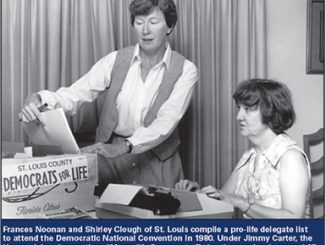

Many social conservatives, though by no means all, were ecstatic at the election of Donald Trump. Whether they’ll still be ecstatic a few months down the line cannot be predicted—and by no means is this uncertainty entirely of Trump’s making.
Start with the Supreme Court.
During the campaign, Trump, who in the past had declared himself pro-choice, said he was now prolife and would name prolife Supreme Court justices. Underlining his commitment, he released the names of conservative jurists from among whom he said he’d make his picks. Social conservative ecstasy thereupon set in.
After he’s sworn in as president, one of the first items on Trump’s agenda will be naming someone to fill the Supreme Court seat vacant since conservative Justice Antonin Scalia’s death last February. Senate Republicans refused even to hold hearings on President Obama’s pick—federal judge Merrick Garland, usually described as a moderate liberal—and Garland’s nomination became a dead letter with the election of Trump.
The obvious question now is whether Senate Democrats, stung by the handling of the Garland nomination, will permit Trump’s nominee to be confirmed or whether they will play tit for tat by blocking him or her. Lacking control of the Senate, Democrats can’t prevent hearings and a committee vote, but they have the muscle to keep the full Senate from confirming Trump’s pick—or, perhaps, just his first choice, in order to make a point.
Will they do that? Wait and see.
However the impending struggle over confirmation turns out, it’s important to realize that, contrary to what’s often said, simply filling Justice Scalia’s seat with another conservative won’t produce a conservative Supreme Court majority on abortion and same-sex marriage.
Why? Because on these issues Justice Anthony Kennedy, customarily described as a conservative, usually votes with the court’s four liberals (Ginsburg, Breyer, Sotomayor, Kagan), thus creating a five-member majority. Adding a social issues conservative to succeed Scalia will increase the social issues minority to four (Roberts, Thomas, Alito, and whoever), but that’s all. On these issues, Trump can’t shift the ideological makeup of the court unless and until he has a shot at naming a replacement for Kennedy or one of the liberals.
The Supreme Court isn’t the only place where Trump’s ability to deliver on his promises to social conservatives will be tested. Pending in Congress are several matters of great importance to them.
Hillary Clinton’s defeat means the Hyde Amendment barring federal funding of Medicaid abortions—a provision whose repeal Clinton promised to seek—is safe, as is its foreign aid counterpart, the Helms Amendment.
Beyond that, though, it’s by no means certain that prolifers have the votes to achieve their cherished goal of defunding Planned Parenthood. Trump has spoken well of Planned Parenthood in general, although agreeing it should not get taxpayers’ money for abortion.
There are similar uncertainties about the chances of pending legislation to bar abortions of “pain-capable” fetuses and to shield people with conscientious objections to same-sex marriage from being forced to cooperate with it. But under Trump the infamous HHS Mandate requiring church-related institutions and groups to pay for contraception and abortion in employee health plans seems certain to go.
In short, Clinton’s loss saves social conservatives from serious damage to their causes while Trump’s victory opens up the possibility of important progress on several fronts—along with new obstacles of course. A lot depends on how hard and skillfully Trump presses to realize the hopes of people whose votes did much to make him president.
If you value the news and views Catholic World Report provides, please consider donating to support our efforts. Your contribution will help us continue to make CWR available to all readers worldwide for free, without a subscription. Thank you for your generosity!
Click here for more information on donating to CWR. Click here to sign up for our newsletter.





